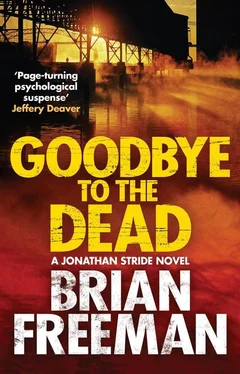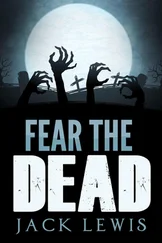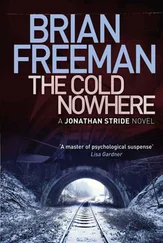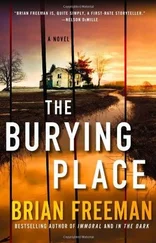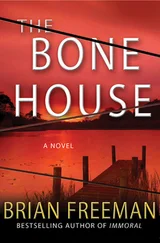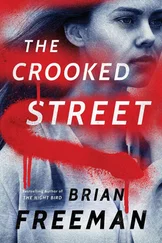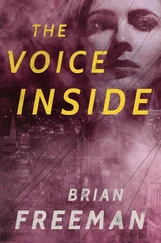‘Verdict,’ someone said.
Cindy looked up. There was a buzz around her. People were talking. They were crowding toward an electronics store with televisions in the window.
She heard it again.
‘There’s a verdict.’
Stride and Maggie walked shoulder to shoulder through the narrow underground tunnel that led from City Hall to the County Courthouse building. The concrete block walls were painted bright white, and so was the ceiling, which was lit with fluorescent tubes. Utility cables ran in a twisted knot beside them.
Maggie’s short legs worked double-time to keep up with Stride. ‘That was quick,’ she said. ‘I didn’t expect a decision so soon.’
‘It was an easy case,’ he replied. ‘Archie blew smoke, but that wasn’t enough. The jury saw through it.’
‘So you think it’s guilty?’
‘I do.’
They emerged through the door into the courthouse basement. They took the steps to the lobby, where reporters crowded into the corridor. It looked like election night. Stride hung back, not wanting to give interviews. He saw Dan Erickson deflecting questions, too, as he squeezed through the sea of people. Politicians knew not to brag until it was a done deal.
Archie Gale kept reporters away from Janine. His face was sober. He knew he’d lost. Janine didn’t look at the floor the way so many defendants did, about to learn their fate. She looked straight ahead into the cameras that flashed in her face, and when she spotted Stride near the head of the steps, her head tilted in an almost imperceptible salute. She was under no illusions.
‘She’s a cool one,’ Maggie murmured.
‘Yes, she is.’
He’d been in this situation many times before. Most of the time, justice won out. Even so, he took no pleasure in it. Every murder had many victims. He had sympathy for Janine Snow and the pressure cooker of her life and the systematic way that her husband had made it worse. She’d snapped. Even smart, beautiful people snapped.
‘Come on,’ he said. ‘Let’s get up to the courtroom.’
‘Hang on,’ Maggie replied.
Her phone was ringing.
She answered and tried to listen above the din. He watched her face and grew concerned. She grabbed his arm, tugging him back to the stairs. When they were out of view of the reporters in the lobby, she waved him urgently downward, and they both jogged to the basement. At the tunnel door, she shoved her phone in her pocket.
‘Gunfire,’ she said. ‘We need to get out there.’
‘Where?’
‘Dickson Street, boss. In Gary. Neighbors report multiple shots.’
‘Is it—?’
She nodded as she ripped open the door, and they both sprinted into the tunnel. ‘It’s Jessie Klayman’s house.’
The Pontiac Firebird that had been parked in the driveway was gone. Otherwise, the house looked as it had two hours earlier when they interviewed Jessie Klayman. Two police cars had Dickson Street closed at 108th, and two more were parked at the dead end. An ambulance waited behind the barricade. The handful of neighbors on the street had been warned to stay inside and away from windows.
Stride called the phone inside the house. No one answered.
‘We think Ross is gone,’ Maggie said. ‘Guppo talked to two teenagers who live across the street. They said he usually drives the Firebird.’
‘Did they see him go?’
‘No, but he may have headed out the back. There’s a dirt road behind the house that leads through the trees to Gary Street.’
‘Get his photo out around the city. The car and license, too.’
‘In process,’ Maggie said.
They wore their vests. Through binoculars, Stride examined the small house and saw no movement at the windows. All the curtains were closed. So was the door to the detached garage. Overhead, the sun was bright in their eyes.
‘We’ve got two officers staking out the back of the lot,’ Maggie said. ‘There’s no activity.’
‘Okay, let’s check it out.’
They used a neighbor’s lawn to approach the house from the east. There were no windows on the east wall other than at the basement level, where there was a door and a look-out window. The detached garage was on their left. As they cleared the neighbor’s house, Stride saw one of his officers in position at the rear of the Klayman lot near the tree line. The cop gave a thumbs up; the rear of the house was secure.
Stride had his gun in his hand. So did Maggie. Guppo and three other cops followed twenty yards behind them.
They reached the Klayman driveway. The house was built against a slope, and a two-level retaining wall and garden led to the front yard. Jessie Klayman kept stone nymphs among the weeds. Stride climbed the first level of the retaining wall at the corner of the brick basement. The windows of the living room were above their heads, and another window at ground level looked into the basement.
No activity.
He pulled himself up to the front lawn. Crossing under the living room windows, he took the wooden steps to the door and pounded sharply with his fist. ‘Jessie! Ross! Police!’
There was no answer. Looking through the storm door, he saw that the front door was wide open. The room where they’d sat with Jessie was empty, but the television was still on. He shouted again and heard nothing but the laughter of a TV sitcom. The living room showed no sign of disturbance.
Stride opened the screen door and went inside. Maggie followed.
‘Jessie!’ he called again. ‘It’s Lieutenant Stride.’
They cleared the kitchen and the living room, which were both deserted. He used the remote control to switch off the television, restoring silence to the house, except for the rattle of the rotating floor fan. It was dim inside with the curtains closed. He pointed at the hallway, where he could see entrances to two bedrooms.
The first door was painted black, but it was open, and an overhead light was on. He nudged around the threshold into the bedroom, and the interior took his breath away. Maggie entered behind him.
‘Oh, shit,’ she said.
There was no bed, just a mattress on the floor. The walls, like the door, were painted black. The glass of the windows had been covered over with black plastic garbage bags duct-taped to the frame. A television sat on an old microwave stand in front of the mattress, and dozens of video games were strewn across the carpet. Gold ammunition littered the floor like popcorn. At least thirty bullet-ridden paper targets were thumbtacked to the wall, along with bizarre posters: a skeleton wearing a Nazi uniform; a naked girl with the head of a jackal and gun barrels for nipples; a skinless zombie in a diaper with blood spurting out of his face; and a Las Vegas casino street littered with torsos and severed limbs.
Across the entire wall, Ross had spray-painted in five-foot red letters: I AM GOD.
‘Jesus, who is this kid?’ Stride murmured.
But they knew who he was. They’d seen him before, in other cities, in schools, in workplaces.
Stride had made mistakes in his life. He’d arrested people who turned out to be innocent. He’d left cases unsolved. He’d failed to protect people he’d sworn to protect. This was different. This time, he’d missed a threat that Maggie had seen too clearly. That his wife had seen. He knew there was no bright line between social misfit and mass murderer, but he hadn’t seen this one coming.
Ross Klayman was out there somewhere. He was going to kill.
‘Where are the guns?’ Maggie asked. ‘Troy said Jessie had guns.’
They investigated the next bedroom, which was Jessie’s room. The gun locker was there, open and empty. No rifles. No handguns. No ammunition. Ross had taken everything when he left the house. If Troy was right, then Ross had an arsenal with him.
Читать дальше
